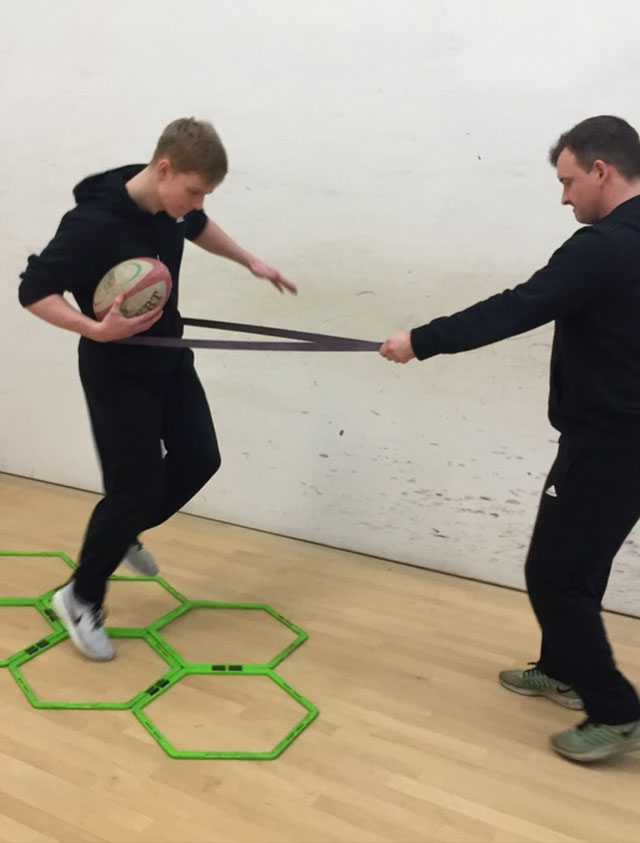We’ve all heard the saying “no pain, no gain,” and when it comes to fitness, we all know that pushing yourself and pushing through the hard parts is the only way to reach your goals. But what often gets forgotten when it comes to fitness, especially for people exploring different types of workouts, is the importance of rest and recovery.
Rest and recovery are crucial to any fitness training program, regardless of whether you’re sticking to an offline regimen in the gym or building your own routine with online fitness training. The truth is, without rest and recovery periods, you won’t get the full benefits of your training and can even risk injury or overtraining. This information is particularly crucial for athletes who need their bodies to perform at their best.
In today’s blog post, we’ll be taking a closer look at why rest and recovery are so important in online fitness training and the best ways to incorporate your much-needed breaks when setting up your program. So, sit back, relax, and let’s get started on your journey to reaching peak performance with rest and recovery, and ensuring that the food you consume during these periods supports your progress!
Quick Summary of Key Question
Rest and recovery are key components of any online fitness training program. They are essential for muscle growth, injury prevention, and improving overall performance for individuals following various types of training.
Why is Rest and Recovery Important?
Rest and Recovery are essential parts of any fitness routine, online or in-person. When we exercise intensely, we put a strain on our bodies, causing damage to our muscles and tissues. If the body is not given time to rest and repair itself, it can lead to a decrease in performance and overuse injuries, potentially leading to long-term health issues. Rest and recovery allows our bodies to heal and helps to prevent overstraining of muscles. Proponents of regular rest and recovery argue that by taking regular breaks from physical activity, it enables our bodies to move more efficiently when we do decide to train as our muscles are well rested and refuelled for future activities.
On the other hand, opponents often say that heavy physical activity should be followed by an immediate return to activity for optimal gains. While there are benefits associated with this strategy that cannot be denied, these same opponents often risk shortening their overall health span due to a lack of recovery. As humans, we need adequate rest periods in order to preserve our physical and mental health, as well as maintaining optimal gains in the gym or training facility. Recognizing the signs of fatigue and incorporating rest days is crucial for every athlete or fitness enthusiast.
As evidenced by both sides of the argument, it is undeniable that rest and recovery days are extremely important components within a healthy fitness routine. Not only do they reduce fatigue levels while aiding in muscle strength and growth, but they also play an important role in protecting us from injury. By transitioning into the next section which focuses on “Benefits of Rest & Recovery for Online Fitness Training,” we will gain more insight regarding how taking time away from intense training can help us reach our full potential no matter what environment we choose to train in.
- Studies suggest that active recovery can improve physical performance and reduce fatigue.
- According to a 2019 review, strategic rest periods can increase an individual’s ability to build muscle and strength over time.
- A study published in 2017 found that rest days may be beneficial for optimal muscle growth in response to weight training.
Benefits of Rest and Recovery for Online Fitness Training
Rest and recovery are a vital component of any physical training plan, including online fitness training programs. Taking rest days and periods of recovery has many benefits that aid in the overall effectiveness of such programs. Adequate rest can help improve muscle strength and endurance, reduce fatigue, prevent injury, and enhance performance.
One key benefit of rest and recovery is improved muscle strength and endurance, which is essential for athletes and individuals engaged in demanding workouts. Ensuring that participants understand the importance of incorporating rest periods into their schedule is a crucial part of any training program, be it online or offline.When you exercise regularly — either through online fitness training or engaging in sports — your muscles are subjected to stress from movement and may become overworked. Taking time for rest allows your body to repair itself and repair damaged muscle tissue, which can help increase muscle flexibility and make them more resilient over time. This helps increase performance during subsequent workouts, such as yoga or high protein sports, as well as reduce the risk of developing chronic pain, muscle soreness or injuring yourself in the process.
The importance of rest is further emphasised by the fact that it helps reduce fatigue levels caused from regular exercise sessions. During exercise, your body works hard to break down energy sources so that it can continue producing energy for longer periods of time. Unfortunately, this constant use of energy reserves can result in extreme fatigue if not allowed enough time to recover. Rest days provide your body with the necessary window to fully recharge, thus restoring its natural energy balance so that subsequent workouts can be completed safely and effectively without any physical drawbacks or exhaustion.
Finally, engaging in rest days properly can also increase your overall performance during online fitness training. Muscles need adequate periods of rest in order for them to take full advantage of all the training they have undergone; otherwise their cells will remain broken down from the stress endured during exercise and may not be able to snag all its potential gains. Thus, consistent rest is essential in order to get the most out of every workout session while simultaneously reducing any additional physical strain placed on your body due to its absence. One of the reasons why it’s important to have a well-designed training schedule is to ensure adequate rest periods are included.
Given this evidence, it’s clear that incorporating periods of appropriate rest into your online fitness training regime is essential for maximising performance gains while reducing chances of long-term damage or injury. Consequently, making sure you factor ample amounts of R&R into your programme is critical for seeing results both quickly and efficiently while staying safe at all times. And though engagement in these brief respites may seem tedious when compared to actual exercises themselves – they are just as integral for success than any other component – with improved muscle strength and endurance ensuring greater returns from each session you complete.
Improved Muscle Strength and Endurance
Adequate rest and recovery has various direct benefits to physical health, such as improved muscle strength and endurance. Examples of these benefits include increased strength and efficient performance during physical exertion. Proper rest also gives the body the fuel it needs to build muscle, as the beneficial hormones released during sleep help stimulate muscle development. Additionally, getting sufficient rest can lessen muscular fatigue, allowing for consistent training over long periods of time and improved ability to handle higher intensity workouts. While some may debate that more strenuous workouts and less rest are needed to reach peak performance levels, scientific evidence has shown that taking regular breaks allows athletes to stay at peak performance longer than their peers who push themselves further without allowing adequate recovery time. With this in mind, it is important for online fitness trainers to incorporate times for rest into their programming in order for participants to take advantage of these positive benefits of muscle strength and endurance.
This concept of utilising rest and recovery for physical gains, such as muscle repair, is paired with a need for mental resilience. Consistently pushing through pain and fatigue without giving one’s body the proper space for recuperation can have long-term negative effects on an athlete’s overall mental health and quality of life. As such, taking time off from training is just as essential as booking in quality sessions to ensure sustained physical performance and well-being over time.
Improved Mental Health
The importance of rest and recovery in online fitness training, as a crucial part of the content, extends far beyond improved muscle strength and endurance. Regular rest days not only allow our bodies to relax and absorb nutrients but also improve our mental health by reducing the number of stress-related symptoms.
Studies have shown that physical activity, such as cardio exercises, plays a fundamental role in managing anxiety and depression. Exercise can decrease stress levels, improve cognitive function and enhance mood by increasing serotonin and dopamine release. Thus, it is crucial to include regular rest days into your programme to facilitate recovery not just physically, but mentally as well.
However, if you are having long-term mental health issues, no amount of physical activity or rest can substitute medical treatment. It should always be remembered that online fitness training is not a long-term solution for mental health issues; nonetheless, it can act as a complementary aid to treat anxiety and depression.
Overall, completing active workouts on certain days and taking rest days in between can positively contribute to overall mental health. The key is finding the right balance between active training sessions and adequate recovery days for your body. This way we can enjoy both the psychological and physical benefits associated with exercise while also allowing ourselves to emotionally recharge before starting a new routine. To make sure we do this optimally, it’s important to understand how best to accommodate for rest and recovery periods during your programme for ultimate success.
Most Important Summary Points
Rest and recovery are just as important as the active training days when it comes to online fitness programmes. Taking regular rest days can improve both physical and mental health by decreasing stress, enhancing moods, and improving cognitive function. However, long-term mental health issues need professional medical treatment that cannot be replaced by physical activity or rest. Finding the right balance between active training sessions and adequate rest days is essential to maximise success in an online fitness programme.
How to Accommodate for Rest and Recovery During Your Programme
One of the most important elements of any fitness programme, including online training programmes, is providing adequate rest and recovery opportunities. Allowing your body to rest gives it time to heal, build muscles, and improve strength. Conversely, overworking can lead to fatigue and even injuries. Fitness enthusiasts have long debated what constitutes optimal rest and recovery periods for any given programme or activity.
Some prefer a more balanced approach, alternating high intensity days with lower effort recovery days. This approach helps muscles recover from intense workouts while also allowing for a slower pace when needed. Others believe that short, intensive endurance activities followed by rest is best for achieving maximum results in the shortest amount of time. Regardless of the method chosen, ensuring a mix of quality exercise and rest days is an essential component of any successful fitness programme.Although these approaches differ significantly, both can be effective depending on individual goals and preferences, whether it’s the improvement of tendons, glycogen replenishment, or even boosting libido.
Regardless of what approach is taken, having adequate rest periods is a must for optimal performance and results. Utilising an online fitness programme allows individuals to customise their schedules and even pause applications when needed. This allows users the freedom to integrate ample recovery windows into their routines without missing out on scheduled workouts or programmes. Additionally, having access to a trainer can ensure that you are adequately resting and not pushing too hard if working out alone. Research has also shown that adequate rest periods can lead to a reduction in body fat.
Improved mental health is another major benefit of rest and recovery periods during any exercise schedule or programme. Regular rest helps manage stress levels while encouraging physical and psychological healing. Taking mandated breaks also allows individuals to disconnect with the virtual world, giving them an opportunity to focus on their own wellbeing. In turn, this can lead to better sleep habits and improved mental focus as well as enhanced overall energy levels throughout the day.
In conclusion, rest and recovery periods are just as important in online fitness training as they are in any other programme or activity. It is essential for success in fitness programmes, whether online or off-line, that individuals integrate designated recovery times into their routine to replenish energy stores, reduce fatigue, prevent muscle strain and injuries, and nurture mental wellbeing for healthy lifestyle habits overall.
Responses to Common Questions
What are the benefits of taking regular breaks between online fitness training sessions?
Regular breaks between online fitness sessions can be incredibly beneficial in helping to maximise one’s training results. Taking regular breaks can give the body time to recover from the demands of intense physical exercise. Recovery time allows for repair and replenishment of energy, as well as reducing the risk of injury due to overexertion or fatigue. Proper recovery also allows for better performance during future workouts, allowing one to train more efficiently and effectively. Lastly, taking regular breaks will help prevent burnout and maintain motivation levels while engaging in a rigorous training routine.
How can online fitness trainers ensure that their clients are getting adequate rest and recovery periods?
Online fitness trainers can ensure their clients get adequate rest and recovery periods by developing an appropriate training plan that includes both rest and physical activity. Typically, when developing a plan, trainers should advise their clients to begin with regular rest periods of up to two days between exercising sessions. This gives the body time to recover from the physical demands of previous workouts while allowing enough time for strength and conditioning gains, such as improvement in tendons. Additionally, trainers should have their clients track their exercise routine in order to assess how hard they are pushing themselves and determine if there is enough time being allocated for rest within their existing workout regimen. Once the trainer has enough data, they can measure the level of intensity being applied by their clients and adjust the plans accordingly so that they incorporate sufficient breaks in order to foster growth without overloading the body. Lastly, it is important for online fitness trainers to encourage their clients to listen to their bodies and take additional rest days as necessary. Doing this ensures that each individual client gets adequate amounts of rest in order for them to progress effectively with online fitness training.
What are some effective strategies for promoting rest and recovery in online fitness training sessions?
Effective strategies for promoting rest and recovery in online fitness training sessions include incorporating active rest periods, emphasising proper nutrition and hydration, designing short but intense programming, providing mental breaks between sets/exercises, and offering plenty of opportunities for stretching.
Active rest periods are brief periods in between exercises or sets during which the body can recover with low-intensity activities such as walking or jogging that keep the heart rate elevated. This helps reduce the risk of overtraining and burnout by giving the body an opportunity to restore energy resources and repair muscle tissue before moving on to more intense movements.
Proper nutrition and hydration are also essential for adequate rest and recovery. Ensuring that clients are consuming enough high-quality proteins, carbohydrates, vegetables, and healthy fats helps bring essential macronutrients into their bodies so they can fuel their workouts properly. Additionally, staying well-hydrated throughout a training session is important to allow the body to repair itself efficiently.
Designing programming that consists of shorter yet more intense workouts can help take stress off the body’s joints. Short bursts of activity allow clients to push themselves to their limits without running the risk of overexertion. This interval approach often increases heart rate more efficiently than working out at a steady state while allowing more time for the body to recover.
Taking occasional mental breaks between sets is beneficial as it gives clients a chance to refocus and re energize before continuing. Mental breaks also provide an opportunity for you as the trainer to discuss technique or recommendation modifications with your client in between physical exertions.
Finally, incorporating stretching before, during, and after exercise has many advantages. Dynamic stretching prior to a workout warms up the muscles slowly yet effectively so that they’re ready for heavier action when it comes time for more intense movements. Stretching post-session helps reduce post-exercise soreness by improving range of motion and correcting any postural deviations caused by a workout session.





